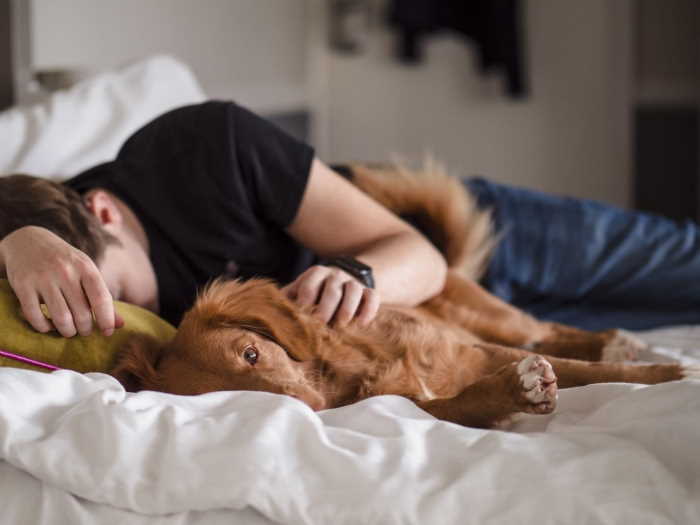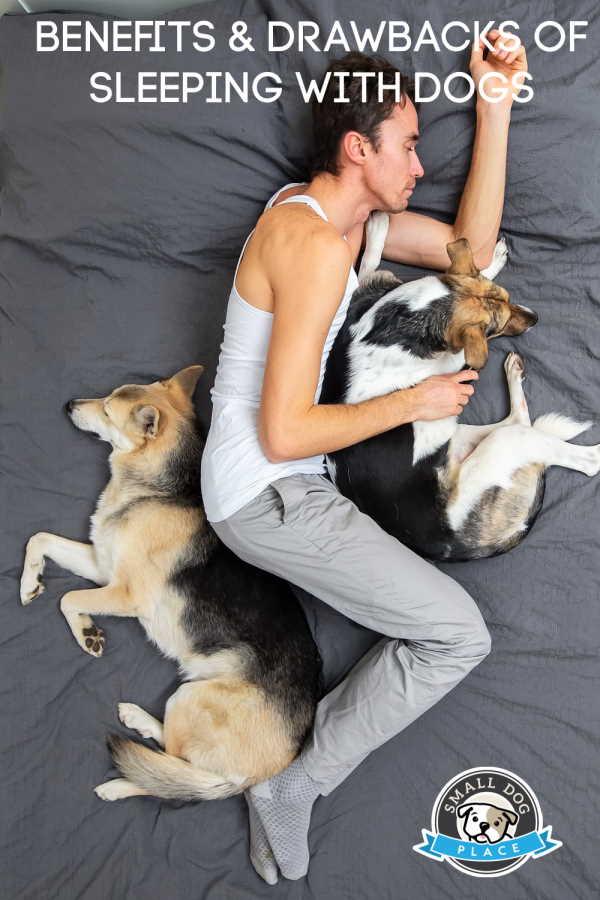- Small Dog Place Home
- Lifestyle
- Sleeping with your dogs
The Benefits and Drawbacks of Sleeping With Your Dogs
Sleeping With Your Dogs by Frankie Wallace |Published 12-21-2021
Many dog owners consider their furry friends to be an integral part of the family. As such, it’s not uncommon for Fido to share your sleeping space.
You might love the comfort and warmth of your dog sleeping next to you, but have you ever considered the benefits and drawbacks?
If you’re already sleeping with your pet, it’s important to know how it could be impacting your health – in positive or negative ways. If you’ve been on the fence about letting your dog share your bed, this article might convince you one way or another.
So, should you let your dog hop into bed with you? Let’s cover the pros and cons so you can make an informed decision.
 Sleeping With Your Dogs
Sleeping With Your DogsBenefits of Sleeping With Your Dogs
Improved Mental Health
Multiple studies have shown the mental health benefits associated with owning a dog. Simply petting a dog can reduce your stress levels and help you to feel calm. Those mental health benefits absolutely carry over when it comes to sleeping with your canine companion.
If you already struggle with mental health conditions, including depression, you might feel fatigued throughout the day. Unfortunately, that fatigue may cause you to want to sleep more. But, because it’s a vicious cycle, your depression might make it hard to get the rest you need.
Sleeping with your dog can put your mind and body into a more relaxed state. They’ll also provide you with comfort and security, which can help if you deal with fear or anxiety.
Loneliness has become a huge problem over the last couple of years, due to the COVID-19 pandemic. Unfortunately, it can lead to a slew of mental health issues. Having your dog share a bed with you is a great way to fight loneliness and keep you from feeling isolated at night.
When you get better sleep (thanks to your pooch!), you’ll feel more awake and alert during the day, which can improve your energy, your mood, and your overall mental well-being.
Potential Health Drawbacks
While sleeping with your dog can provide many mental health benefits, it could cause some issues to your physical health if you have allergies or respiratory issues. If you already sleep with your dog, think about how you feel when you wake up. Do you have any of the following?
- Runny nose
- Itchy, watery eyes
- Sore throat
- Cough
- Congestion
If so, you might be allergic to your four-legged friend. You might already know you have allergies, but you’re able to manage them during the day.
Spending time in the same house as your dog is different from sleeping with them by your side. When you’re breathing in pet dander all night, it could wreak havoc on your allergy issues.
Even if you don’t have allergies or any underlying conditions, your dog can transfer things to your bed that you probably don’t want, including:
- Dirt
- Hair
- Fleas
- Ticks
- Potential messes (sickness or accidents)
By keeping your dog clean and healthy, you can reduce the risk of anything creepy or crawly ending up in your bed. But, keep in mind that it’s never 100% preventable.
Eased Insomnia
There isn’t a lot of solid evidence one way or another that suggests sleeping with a dog affects your quality of rest. But, if you’re someone who struggles with insomnia or has a hard time getting to sleep, the security and warmth provided by a dog can help you get the rest you need.
It’s especially helpful to set up a nighttime routine for both you and your dog, so you both know it’s time to wind down and rest. Going through a routine can improve your overall sleep hygiene, and put your mind in the right state to “decompress”.
Of course, if you travel a lot or have to be away from your dog for any reason, using them for this benefit could end up being harder on both of you. Not only will it be more difficult for you to sleep without your companion, but the change in routine could trigger separation anxiety in them. If you want to ease the effects of separation anxiety, try:
- Emotionally preparing your pet before you go
- Making sure they’re happy
- Leaving them with someone they know
- Letting them sleep with something that smells like you
You can also help yourself by carrying a picture of your dog with you and checking in frequently with whoever is watching them. Keep the rest of your nighttime routine as normal as possible. You might not get the same quality sleep, so that’s something to consider if you’re frequently on the road.
In the end, whether you choose to sleep with your dog is completely a personal choice. Weigh out the pros and cons to determine what’s best for your situation. They need rest just as much as you do, so make sure whatever you decide gives you both the opportunity to sleep soundly night after night.
Sleeping with Your Dogs: Author Bio
Frankie Wallace is a frequent contributor to Small Dog Place. She is a freelance writer from Boise, ID. If her spirit animal could be anything, it would be a beagle--inquisitive, and always searching for food.
Other Articles by Frankie Wallace
Small Dog Obesity: Your Dog Isn't Chunky--It's Obese
The Benefits and Challenges of Having Pets in the Workplace
How to Guide Your Senior Dog Into Aging with Ease
How A Dog Can Promote Healthy Living
How to Care for Dogs with Sensitive Stomachs
How small dogs help cancer patients: Having a Small Dog Can Boost Positivity for Cancer Patients
About Janice (author and voice behind this site)
Having lived with dogs and cats most of her life, Janice served as a veterinary technician for ten years in Maryland and twelve years as a Shih Tzu dog breeder in Ohio.
Her education includes undergraduate degrees in Psychology with a minor in biology, Early Childhood Education, and Nursing, and a master's in Mental Health Counseling.
She is a lifelong learner, a dog lover, and passionate about the welfare of animals. Her favorite breed for over 50 years has been the Shih Tzu, but she has also lived with Poodles, Maltese, Yorkshire Terriers, Beagles, English Bulldogs, Carin Terriers, and a Cocker Spaniel.
When not writing, reading, and researching dog-related topics, she likes to spend time with her eight Shih Tzu dogs, husband, and family, as well as knitting and crocheting. She is also the voice behind Miracle Shih Tzu and Smart-Knit-Crocheting
Does This Article Deserve Your Thumbs Up?
We always appreciate your support and encouragement. Your thumbs up means so much to us. Please like this article.
If you find this page or any page on Small Dog Place Helpful, or useful in anyway, I'd love it if you would click the small heart found on the bottom right of each page.
You can also share or bookmark this page -- just click on the:

Free Monthly Newsletter
Sign Up for Our Free Newsletter and get our Free Gift to You.
my E-book, The Top 10 Mistakes People Make When Choosing a Dog (and how to avoid them)


